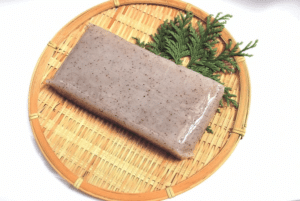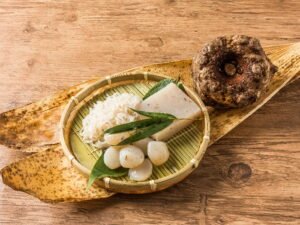
Konjac Drinks: Understanding Their Health Benefits and Uses
Konjac Drinks: Understanding Their Health Benefits and Uses
- Andrew Yang
- December 2, 2023
- 6:28 am

Table of Contents
A new contender has emerged in the ever-evolving landscape of health-conscious beverage choices: konjac drinks. Originating from the konjac plant, native to East Asia and long revered for its diverse culinary applications, konjac has now garnered attention for its transformation into a refreshing and potentially health-boosting drink.
This article embarks on a journey to unravel the mysteries surrounding konjac drinks, delving deep into their origins, nutritional composition, and the health benefits of their consumption. Moreover, it aims to shed light on the diverse utility of konjac beverages, showcasing their potential as more than just a thirst-quencher but a viable addition to a health-conscious lifestyle.
Join us as we unravel the mysteries, debunk the myths, and celebrate the potential of konjac drinks—a fusion of tradition, health, and the thirst for wellness in a single, intriguing sip.
What is Konjac?
Introduction to the Konjac Plant
The konjac plant, scientifically known as Amorphophallus konjac, is a perennial herbaceous plant native to East Asia, predominantly found in countries like Japan, China, and Korea. This unique plant belongs to the Araceae family and thrives in subtropical to tropical climates.



Key Component: Glucomannan
At the heart of Konjac’s allure lies its key component: glucomannan. This soluble fibre, primarily extracted from the konjac plant’s corms, contributes to the plant’s numerous health benefits. Glucomannan is renowned for its exceptional ability to absorb water, forming a gel-like substance in the digestive system. This property not only aids in providing a feeling of fullness but also assists in regulating bowel movements, promoting digestive health, and potentially assisting in weight management efforts.
Cultural Significance and Traditional Use
Konjac has historically held cultural significance, particularly in Japanese and Chinese cuisines. The plant’s corms have been utilized in various culinary applications for centuries. Notably, konjac-derived products like shirataki noodles, konnyaku jelly, and konjac flour have been staples in Asian cuisine. Beyond its culinary uses, konjac has been revered for its medicinal properties in traditional herbal remedies, believed to aid ailments like coughs, skin conditions, and more.
Harvesting and Processing
Harvesting konjac involves extracting the corms, bulb-like structures within the plant’s root system. After harvesting, these corms undergo meticulous processing to transform into various consumable forms. For konjac drinks, the corms are processed to extract glucomannan, which forms the base ingredient for these beverages.
Regulatory and Safety Considerations
Due to its unique properties, particularly its ability to swell and absorb water significantly, safety considerations. Regulatory bodies oversee the safe use of konjac-derived products, ensuring they meet specific safety standards. Proper processing and adherence to safety guidelines are imperative to minimize any potential risks associated with consumption.
Sustainability and Environmental Impact
Konjac cultivation often boasts environmental sustainability. The plant can thrive in diverse conditions and has a relatively low environmental impact. Requiring minimal pesticide use and thriving in various soil types—make it an eco-friendly crop. Furthermore, its biodegradable nature adds to its appeal as a sustainable agricultural resource.
Nutritional Composition of Konjac Drinks

Caloric Content and Macronutrients
Konjac drinks stand out for their notably low-calorie content compared to many conventional beverages. These drinks are often incredibly low in calories, making them a preferred choice for individuals aiming to manage their caloric intake.
Fiber Content and Glucomannan
One of the defining nutritional attributes of konjac drinks lies in their high fibre content, primarily attributed to glucomannan—the star component derived from the konjac plant. Glucomannan, being a soluble fibre, has an exceptional ability to absorb water, forming a gel-like substance in the digestive system. This property contributes to increased satiety, promoting a feeling of fullness and aiding in digestive health by supporting regular bowel movements.
Vitamins and Minerals
While konjac drinks may not be a significant source of vitamins or minerals, they can contain trace amounts of certain essential nutrients. These may include calcium, iron, and small amounts of vitamins like vitamin A or C, though the quantities are often minimal and may not significantly contribute to daily nutritional requirements.
Absence of Certain Nutrients
What sets konjac drinks apart from many other beverages is their absence or minimal presence of certain nutrients commonly found in other drinks. For instance, konjac drinks typically contain no sugars or fats, making them attractive for individuals seeking healthier alternatives or those managing specific dietary requirements.
Comparison with Other Beverages
Comparatively, when stacked against other conventional beverages such as sodas, fruit juices, or energy drinks, konjac drinks showcase a marked difference in nutritional composition. These comparisons highlight the superior attributes of konjac drinks in terms of lower caloric content, higher fibre levels, and the absence of added sugars or fats, making them a preferable option for health-conscious consumers.
Scientific Studies and Health Implications
Scientific studies support the potential health implications of the nutritional composition of konjac drinks. The high fibre content, especially derived from glucomannan, has been linked to various health benefits, including aiding in weight management, controlling blood sugar levels, and contributing to improved digestive health.
Health Benefits of Konjac Drinks
Digestive Health and Satiety
Konjac drinks, enriched with glucomannan, offer significant benefits for digestive health. Glucomannan’s soluble fibre content aids in maintaining regular bowel movements, alleviating constipation, and promoting a healthy gut environment. Moreover, its water-absorbing properties create a feeling of fullness, potentially curbing excessive food intake and aiding in weight management.
Weight Management Support
Glucomannan in konjac drinks has been associated with weight management benefits. By expanding in the stomach and delaying gastric emptying, glucomannan contributes to increased satiety, potentially reducing overall calorie intake. Studies suggest that regular consumption of glucomannan may assist in weight loss by promoting a feeling of fullness, thereby reducing the likelihood of overeating.
Blood Sugar Regulation
Konjac drinks may aid in managing blood sugar levels, which is particularly beneficial for individuals with diabetes or those aiming to stabilize their glucose levels. Glucomannan’s ability to slow down carbohydrate absorption may contribute to more controlled blood sugar spikes after meals, potentially assisting in managing insulin levels.
Cholesterol Management
Research indicates that the soluble fibre in konjac drinks, namely glucomannan, may positively impact cholesterol levels. Regular consumption may help lower LDL cholesterol (called “bad” cholesterol) levels, reducing cardiovascular disease risk.
Potential Appetite Control and Cravings Reduction
Beyond aiding in weight management, konjac drinks might contribute to controlling cravings and curbing appetite. Glucomannan’s capacity to create a feeling of fullness could reduce the desire for frequent snacking. Or consuming larger meals, supporting efforts to maintain a balanced diet.
Konjac Drinks in the Market
Rising Demand and Market Dynamics
The global shift towards healthier lifestyles has fueled a growing interest in konjac-based products, especially beverages known for their low-calorie content and high fibre levels. As consumers increasingly seek nutritious alternatives, the konjac drinks market has witnessed a surge in demand.
Konjac Bites: Wholesale Konjac Items
Konjac Bites stands out in the market for its extensive range of konjac-based products available for wholesale purchase. Beyond beverages, their inventory encompasses a diverse selection, including noodles, snacks, and various other konjac-infused items. Catering to retailers and businesses, Konjac Bites provides an opportunity to access bulk orders of these sought-after products.
Market Insights and Future Prospects
While the Konjac drinks market grows robust, challenges such as consumer awareness and regulatory concerns persist. However, the market’s trajectory appears promising. Driven by evolving consumer preferences, technological advancements in product formulations.
Conclusion
These drinks, enriched with glucomannan and boasting low-calorie, high-fibre attributes, offer more than just refreshments. Their potential benefits span aiding digestion, supporting weight management, regulating blood sugar levels, and contributing to improved overall health. Konjac drinks are a noteworthy contender in pursuing wellness-focused beverages.













